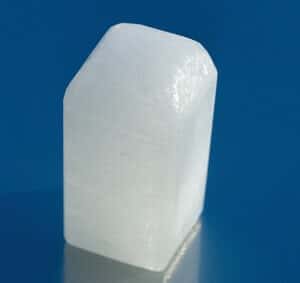
Q. I have relied on a crystal antiperspirant for years on the assumption that it contains no aluminum. It even says on the label “No Aluminum Chlorohydrate.” In addition the front labels states that it is hypoallergenic and both fragrance and paraben free. I thought this product addressed all my health concerns.
I was surprised by your comment that crystal deodorants do contain aluminum. Should I be concerned that it utilizes potassium alum as a primary ingredient?
A. The makers of crystal deodorants have been somewhat evasive in the labeling of their “natural” products. If “alum” is one of the ingredients you can be assured that aluminum is playing a key role in the action of the deodorant.
Don’t take our word for it, however. Check out an online dictionary definition of alum:
“Any of various double sulfates of a trivalent metal such as aluminum, chromium, or iron and a univalent metal such as potassium or sodium, especially hydrous aluminum potassium sulfate, AlK(SO4)2·12H2O, widely used in industry as clarifiers, hardeners, and purifiers and medicinally as topical astringents and styptics.”
Alum is used in water treatment plants to precipitate suspended particles and make the water prettier (clear and sparking). Styptic pencils contain alum to stop the bleeding from a nick after shaving.
The real question is how dangerous is aluminum in your armpits? That remains highly controversial.
There are data to suggest that aluminum is not good for the brain. Other research suggests that aluminum can affect the way cells divide (and not in a good way). Suffice it to say, our bodies could do very nicely without any aluminum. It is not essential for health and may be injurious.
Magnesium, on the other hand, is absolutely crucial for good health. We cannot function without magnesium. It affects virtually every cell in the body and many people are deficient in magnesium.
Why, you might ask, are we discussing magnesium? Because we think it makes a very safe alternative for controlling underarm odor. We don’t exactly understand the mechanism. It may be that magnesium changes the pH of the underarm tissue and makes the environment less hospitable to the bacteria that cause BO. Whatever the reason, you may find some of these stories about milk of magnesia (magnesium hydroxide) as a deodorant refreshing:
“Switched to MoM (milk of magnesia) a few years ago and love it. No more odor! You have to get used to the damp feeling but for odor it works better than any commercial deodorant I tried. I buy the generic brand in the big bottle. It does not stain clothing either.”
Sue
“I like a using a spray type deodorant, so I bought milk of magnesia and put it in a tabletop mister with a clog free filter. I shake before spraying and it works like a charm! I bought brand name milk of magnesia because I noticed that generic brand contained additives I did not want. I ordered the mister online.”
NBF
“For many years I’ve used the crystal deodorants, believing they were safer than the usual deodorants, in particular that they were free of aluminum. The first brand of crystal deodorant I bought listed the ingredient “mineral salts” on the label (that’s all). Of course, my knowledge of chemistry is poor, so that sounded OK to me.
“Now I’ve thrown out what I had and bought the milk of magnesia roll-ons from People’s Pharmacy. I only wish I’d known how deceptive the crystal businesses were–all the money I’ve spent over the years for something that turned out to be false…”
Sue B.
Anyone who would like to give our People’s Pharmacy Milk of Magnesia Roll-On Deodorant a try can get find it in our online store. Let us know what you think. Of course we also invite you to try house brand milk of magnesia and splash it on your underarms or try the mister that NBF mentions above. Do read the label, however. We have discovered that most of the milk of magnesia that you buy over the counter contains bleach (sodium hypochlorite) as a preservative. Our MoM deodorant is specially formulated to be gentle on your skin and does not contain bleach.

